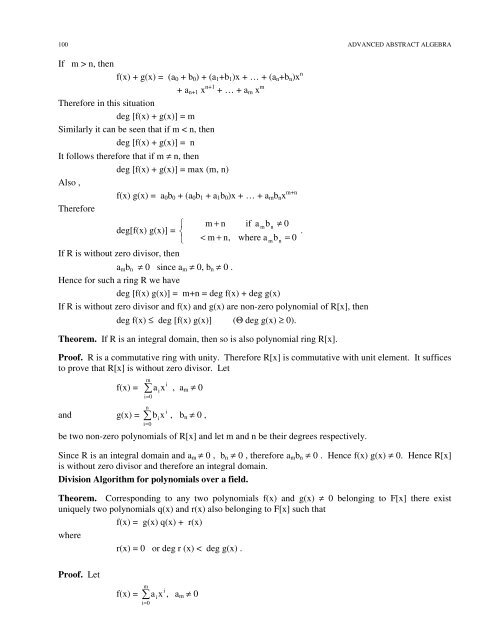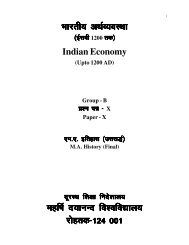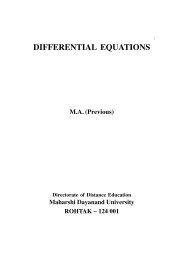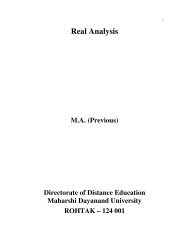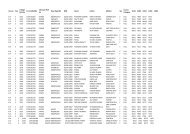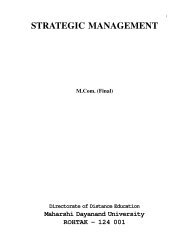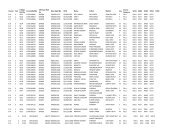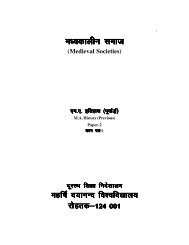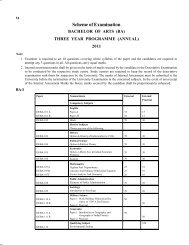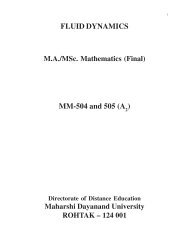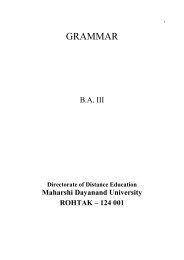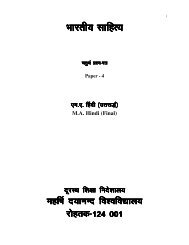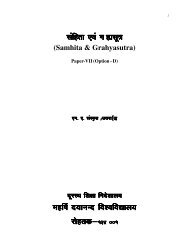Advanced Abstract Algebra - Maharshi Dayanand University, Rohtak
Advanced Abstract Algebra - Maharshi Dayanand University, Rohtak
Advanced Abstract Algebra - Maharshi Dayanand University, Rohtak
Create successful ePaper yourself
Turn your PDF publications into a flip-book with our unique Google optimized e-Paper software.
100<br />
ADVANCED ABSTRACT ALGEBRA<br />
If m > n, then<br />
f(x) + g(x) = (a 0 + b 0 ) + (a 1 +b 1 )x + … + (a n +b n )x n<br />
+ a n+1 x n+1 + … + a m x m<br />
Therefore in this situation<br />
deg [f(x) + g(x)] = m<br />
Similarly it can be seen that if m < n, then<br />
deg [f(x) + g(x)] = n<br />
It follows therefore that if m ≠ n, then<br />
deg [f(x) + g(x)] = max (m, n)<br />
Also ,<br />
f(x) g(x) = a 0 b 0 + (a 0 b 1 + a 1 b 0 )x + … + a m b n x m+n<br />
Therefore<br />
deg[f(x) g(x)] = m + n if a<br />
mbn<br />
≠ 0<br />
.<br />
< m + n, where a b = 0<br />
If R is without zero divisor, then<br />
a m b n ≠ 0 since a m ≠ 0, b n ≠ 0 .<br />
Hence for such a ring R we have<br />
deg [f(x) g(x)] = m+n = deg f(x) + deg g(x)<br />
If R is without zero divisor and f(x) and g(x) are non-zero polynomial of R[x], then<br />
deg f(x) ≤ deg [f(x) g(x)] (Θ deg g(x) ≥ 0).<br />
Theorem. If R is an integral domain, then so is also polynomial ring R[x].<br />
Proof. R is a commutative ring with unity. Therefore R[x] is commutative with unit element. It suffices<br />
to prove that R[x] is without zero divisor. Let<br />
and<br />
m<br />
i<br />
f(x) = a x , a i m ≠ 0<br />
i=<br />
0<br />
n<br />
i<br />
g(x) = b x , b i n ≠ 0 ,<br />
i=<br />
0<br />
be two non-zero polynomials of R[x] and let m and n be their degrees respectively.<br />
Since R is an integral domain and a m ≠ 0 , b n ≠ 0 , therefore a m b n ≠ 0 . Hence f(x) g(x) ≠ 0. Hence R[x]<br />
is without zero divisor and therefore an integral domain.<br />
Division Algorithm for polynomials over a field.<br />
Theorem. Corresponding to any two polynomials f(x) and g(x) ≠ 0 belonging to F[x] there exist<br />
uniquely two polynomials q(x) and r(x) also belonging to F[x] such that<br />
f(x) = g(x) q(x) + r(x)<br />
where<br />
r(x) = 0 or deg r (x) < deg g(x) .<br />
m<br />
n<br />
Proof. Let<br />
m<br />
i<br />
f(x) = a i<br />
x , a m ≠ 0<br />
i=<br />
0


